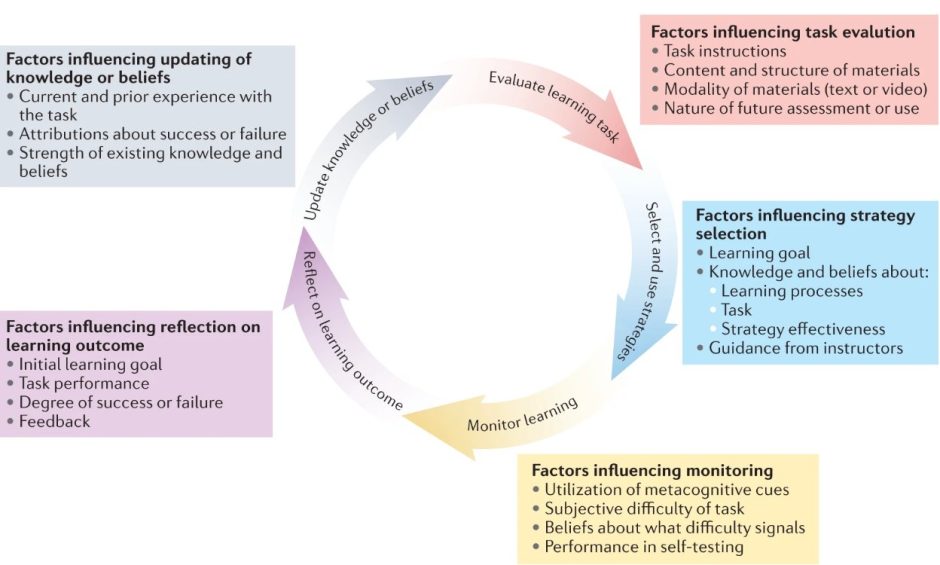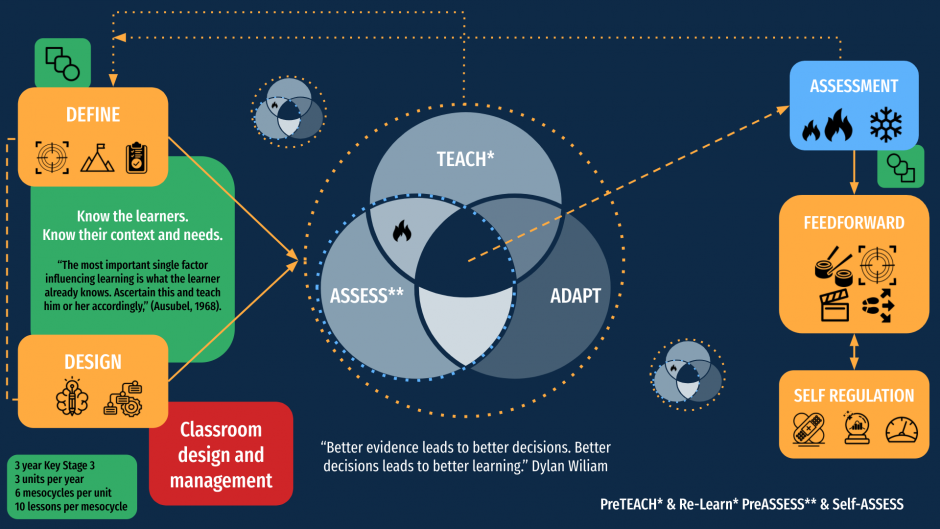At the beginning of the week @BradleyBusch shared a new retrieval study, Sumeracki & Castillo (2022) “Covert and overt retrieval practice in the classroom,” with a bit of cold-calling thrown into the mix too. Bradley’s summary of the paper: “covert produces similar results but is quicker, so could be more efficient.”
I have been interested in the relative benefits of covert retrieval, applied in the design of personalised spaced retrieval practice app – Remembermore. Understandably I was keen to read the paper – however our pupils took precedent with exam results day.
Just to be clear the overt-covert distinction relates to the retrieval format – specifically the response format. Pupils retrieving information can answer “in their heads” (covert) or by producing written, typed or spoken responses (overt), or indeed both. Written and typed are by far the most common.
Tauber et al, (2018) had pupils study key terms and the corresponding definition. Pupils then restudied the key terms/definitions or tested themselves; the pupils who tested themselves typed the definition (overt) or recalled it mentally (covert). Pupils in all three groups made judgements about their performance and returned two days later for a test. Final recall was “moderately” greater after overt retrieval than after covert retrieval or restudy. The recommendation that pupils use “overt retrieval when using retrieval practice as a strategy to learn complex materials”.
However, research also suggests that overt and covert retrieval have similar effects, particularly when learning simple facts (Putnam & Roediger, 2013; Smith et al, 2013), that “both can be effective study strategies.”

In the Smith et (2013) paper, the “Smith” in Smith et al is Dr Megan Sumeracki, published under her maiden name. Let’s take a look at experiment 4 where all forms of overt responding were removed during initial learning, with a test phase designed for higher success rates where participants completed a cued response (the first two letters of the response provided). Eg Vegetable – cu_________ (Answer cucumber. Now I accept that a cucumber is not a vegetable however that was the example in the paper.)

“…both overt and covert retrieval practice benefit memory more than restudying the items,”
Smith et al, (2013).
But as you can see, in this experiment, participants in the covert retrieval condition performed better on the retention test than those in the overt retrieval conditions.
These papers suggesting:
“that it is the act of retrieval that is critical in driving the testing effect rather than overt response production,”
Putnam & Roediger, (2013).
Smith and Castillo (2022) conclude with Sundqvist et al, (2017) meta analysis summary of 13 experiments – the overall effect of overt over covert retrieval to be very small (d=.07).
The extra time it takes to write out an overt response is likely not worth the small effect it may produce over covert retrieval.
We will come back to this later.
Covert and Overt Retrieval Practice in the Classroom
Authentic educational materials, live educational contexts – in the classroom, undergraduates, junior or senior psychology majors.
Experiment 1 – Covert retrieval, led to better final test performance 5 days later relative to restudying. Covert retrieval also led to greater confidence than overt retrieval. Interesting.
Experiment 2 – Covert retrieval with added motivation, a cold-calling procedure, led to “no difference between overt and covert retrieval.” Both types of retrieval leading to better final assessment performance 2 days later relative to a standard lecture.
The importance of retrieval actually being enacted appears to be the key. Required to produce an answer, overtly, led to greater memorial gains. In much the same way, cold-calling, the possibility of being required to produce an answer, enact retrieval – and levelled the playfield.
What was also interesting was Dr Sumeracki informal observation in her email that “when students use covert retrieval they tend to be more confident than if they use overt retrieval.” A possible illusion of competence or familiar heuristic. Also noted at the end of the paper.
Smith and Castillo (2022) recommendations, if there is sufficient time, or when it is feasible, go with overt retrieval. If not, use covert retrieval and insert cold calling opportunities.
Why is the overt-covert distinction important?
Given that, for the most part, there are similar benefits for types of retrieval, “particularly on learning simple facts or paired associates” why wouldn’t you use the more efficient covert mode?
The question raised here is often over how much “effort” is invested by learners when retrieving covertly and, in fact, whether or not retrieval has actually taken place at all. It is almost impossible for teachers to infer covert retrieval without some form of response proxy. As Smith et al (2013) note “we cannot report how many items they correctly recalled (in training), but our instructions emphasized that they should attempt covert retrieval.”
There is also the question of “Production Effects.” That overt responses require “distinctive processing,” leading to direct memory benefits. That is not to say that teachers could not use oral production to ensure covert retrieval has taken place – as with cold calling. But what about choral calling? Or hot-seating quizzing time trials (randomly selecting pupils to answer x questions as fast as possible. In our Alternative Provision English class pupils could name 15 Romeo and Juliet characters in under 20s!)
Not writing or typing a response is super efficient and most certainly allows for many, many more retrieval attempts. Many more potential direct benefits. How else might we ensure retrieval takes place – with RememberMore we went with confidence bases assessments, Heitmann et al, (2022) went we Cognitive Load ratings.
Closing thoughts – retrieval practice benefits are “quite robust across these manipulations.” There are clearly benefits or perhaps securities with overt retrieval, particularly when introducing and encoding new knowledge and in recording knowledge in pupils exercise books. However, when it comes to relearning. I recommend moving to covert retrieval – given the greater breadth of knowledge that can be covered in the equivalent or less time. Even better, if you are able to personalise the questions as a result of their success rates – right Dr Heitmann?
Heitmann, S., Grund, A., Fries, S., Berthold, K., & Roelle, J. (2022). The quizzing effect depends on hope of success and can be optimized by cognitive load-based adaptation. Learning and Instruction, 77, 101526. https://doi.org/10.1016/j.learninstruc.2021.101526
Putnam, A.L., Roediger, H.L. Does response mode affect amount recalled or the magnitude of the testing effect?. Mem Cogn 41, 36–48 (2013). https://doi.org/10.3758/s13421-012-0245-x
Sumeracki, M. A., & Castillo, J. (2022). Covert and overt retrieval practice in the classroom. Translational Issues in Psychological Science, 8(2), 282–293. https://doi.org/10.1037/tps0000332
Smith, M. A., Roediger, H. L., 3rd, & Karpicke, J. D. (2013). Covert retrieval practice benefits retention as much as overt retrieval practice. Journal of experimental psychology. Learning, memory, and cognition, 39(6), 1712–1725. https://doi.org/10.1037/a0033569
Sundqvist, M. L., Mäntylä, T., & Jönsson, F. U. (2017). Assessing boundary conditions of the testing effect: On the relative efficacy of covert vs. overt retrieval. Frontiers in Psychology, 8, Article 1018. https://doi.org/10.3389/fpsyg.2017.01018
Tauber, S. K., Witherby, A. E., Dunlosky, J., Rawson, K. A., Putnam, A. L., & Roediger, H. L. III. (2018). Does covert retrieval benefit learning of key-term definitions? Journal of Applied Research in Memory and Cognition, 7(1), 106–115. https://doi.org/10.1016/j.jarmac.2016.10.004




Pingback: Reading out loud – proven benefits – Edventures